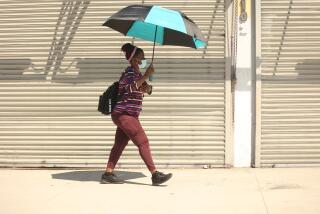Recalling Elderly Victims of Heat
A week ago -- amid unrelenting triple-digit temperatures -- Donald Ahrens, 72, seemed to have a premonition. That morning, as he had each day for the last five years, the Bakersfield resident took a newspaper to his neighbor, Shirley Mackey. She knew him as a man of few words, but on that day he made a request.
“He just said, ‘I passed out. I wanna know if you’ll keep your eye out for me. And if you don’t see me, will you call my kids?’ ” Mackey recalled.
When two days went by with no morning paper from her friend, Mackey, who is 75 and in ill health herself, telephoned Ahrens’ son. That afternoon, Ahrens was found face down in the kitchen of his sweltering home -- with heat listed by the Kern County coroner as a contributing factor in his death from cardiovascular disease.
Like many who have died, Ahrens was older, in poor health, living alone, on a fixed income and reluctant to use cooling devices even as temperatures soared past 110 degrees.
“He had a swamp cooler, but he wouldn’t use it,” Mackey said, referring to a machine that cools air through evaporation of water and costs less to run than an air conditioner. His “kids told me he wouldn’t spend the money,” she said.
“People on these fixed incomes -- “it’s hard to pay these bills. You can’t do it,” she said.
Ahrens is one of more than 140 people whose deaths are believed tied to California’s deadliest heat wave in generations. Some left behind grieving loved ones. Others lived largely solitary existences, a factor that officials said probably put them at greater risk in the heat.
Sarafin Mendez, 70, may have been dead for some time before his body was discovered more than a week ago in a trailer he had parked for some years in a Fresno family’s backyard. When he moved onto the property, according to the homeowner, Mendez said he was retiring after long working in the fields.
“He asked if we had a little room for him, because he was all alone,” said Rosa Bermudes, who let him stay for a monthly fee.
On the evening of July 22, Bermudes’ daughter-in-law noticed a “bad odor” coming from the trailer, said Jeff Cardinale, a spokesman for the Fresno Police Department. She and her husband climbed into the trailer to find Mendez dead on his bed.
The outside temperature topped 100 degrees that Saturday, and the trailer did not appear to be equipped with air conditioning or any other cooling system.
The family did not know Mendez’s medical history, Cardinale said.
When he wasn’t walking around the neighborhood, he frequented a nearby mall -- possibly to cool off, she said. About 4 to 5 p.m. every day, he would return for dinner, but he never ate with them, she said.
“He was a nice man,” Bermudes said. “He liked to walk underneath the trees all day.”
In another Fresno neighborhood Friday, Antonio Serrano cried for minutes at a time, unable to speak. He had found his wife lying dead on a daybed in their living room last Sunday. Police said that Serrano first called a funeral home and that a funeral worker called emergency responders.
Fresno police officers found Celia Castro, 78, with her eyes closed and mouth open, “as if she were sleeping,” Cardinale said. Because the temperature in Castro’s home was higher than the outside reading of 113 degrees, officials think heat may have played a role in her death.
A fan blew air directly at Castro, but police officials said it provided no relief.
“Oh, she was hot,” Serrano said, shaking his head.
Neighbors described Serrano and Castro, who never had children, as constant companions. Before Serrano retired as a gardener, they said, she would go to work with him almost every day. The couple also worked side by side building the modest, one-story brick home they lived in for 20 years.
“They worked on that house for months, and they worked on it together,” said John Martinez, 70, who lives across the street.
Another neighbor, Julia Carillo, 76, said that every day before the couple left for work, Castro would wash her husband’s truck.
“She loved to be out in her flowers, gardening,” Carillo said. “She always wore dresses, all the time, and an apron because, when she was healthy, she cooked.”
Serrano said his wife became sick about a year ago, complaining of itching and stomach pains. After years of tending the cactuses in their backyard and cooking, Castro was instead bedridden and forced to spend her time indoors.
After her death, friends recalled Castro in healthier days.
“The one thing about that woman was that she was nice,” said Martinez, who knew her for many years, “and beautiful -- no doubt about that.”
In Sacramento, where at least 11 deaths have been attributed to the heat, the bodies of Robert Reynolds and Victor Sanchez were found Tuesday in their rooms at the Grand Hotel, where the elderly men had lived for the last two decades. The 10th Street hotel is just down the street from the state Capitol. There is no air conditioning.
The hotel’s manager, Tariq Khan, said the men had befriended each other and the staff over the years. Still, Khan said he knew little about their lives or families.
He said Sanchez, 79, kept to himself most days -- coming to his door only if a staff person went to check on him. Khan said he knew even less about Reynolds, 80.
On Monday, Khan stopped by Reynolds’ and Sanchez’s rooms to ask if everything was OK. Khan -- who called this summer the hottest he could remember -- said they were both fine.
But when a hotel staff person went to check on them Tuesday, the knocks were unanswered.
“It’s really unfortunate.... They were great guys,” said Khan, who identified the two bodies. Because coroner’s officials have been unable to locate relatives, the men’s identities have not been confirmed, a coroner’s spokeswoman said Friday.
Another victim, Myrna Gladys Flosi, 82, was found dead Monday in her overheated mobile home. For the last decade, neighbors said, she had kept herself confined within its walls, stepping out onto Redwood Lane only to pick up her newspaper.
The “dear heart,” as neighbor Rita Chambers called Flosi, had survived more than eight decades of sizzling Sacramento summers. But this season, her air conditioner was on the fritz, Chambers said.
When temperatures reached triple digits last Sunday, baking the senior citizen mobile home park and the residents inside, Chambers invited Flosi to rest in cooler air in Chambers’ trailer. She refused. She wouldn’t even let Chambers bring over a fan.
“I don’t think she really realized how hot it was,” a remorseful Chambers recalled Friday. “It’s still pretty fresh, the memories. It’s just something that you don’t forget.”
Now, Chambers wonders whether there was more that could have been done.
“I know you always say there’s something you wish you could’ve done differently,” Chambers said, “ ... but you can’t just push your will against old people who are set in their ways.”
Friends of Alma Marie Guidera, who died at her Sacramento home July 22, said that was the case with her.
Guidera, 84, had an air conditioner but didn’t like to use it, saying it cost too much and aggravated her arthritis.
Instead, Guidera relied on Pancho Lopez, her neighbor of 33 years, to keep her cool with ice bags -- for the back of her neck, the front of her chest and the pulse points of her arms -- and frozen juice bars.
But on the day she died, Lopez said, even those remedies seemed too little.
She told him: “I’m hot. I’m gonna lay down.”
He found her motionless on her couch when he arrived with more ice to cool down the woman he remembered dancing with his mother at the Moose Lounge. She looked as though she were sleeping, he said.
“She’d been telling me for the past few days that she was tired,” Lopez said of the 84-year-old, who had no children but loved him like family.
“It was just too much heat,” he said. “Just too much at one time. And it never cooled down at night.”
Times staff writer Megan Garvey contributed to this report. Doan reported from Fresno, Caldwell and Surdin from Los Angeles.
More to Read
Sign up for Essential California
The most important California stories and recommendations in your inbox every morning.
You may occasionally receive promotional content from the Los Angeles Times.










